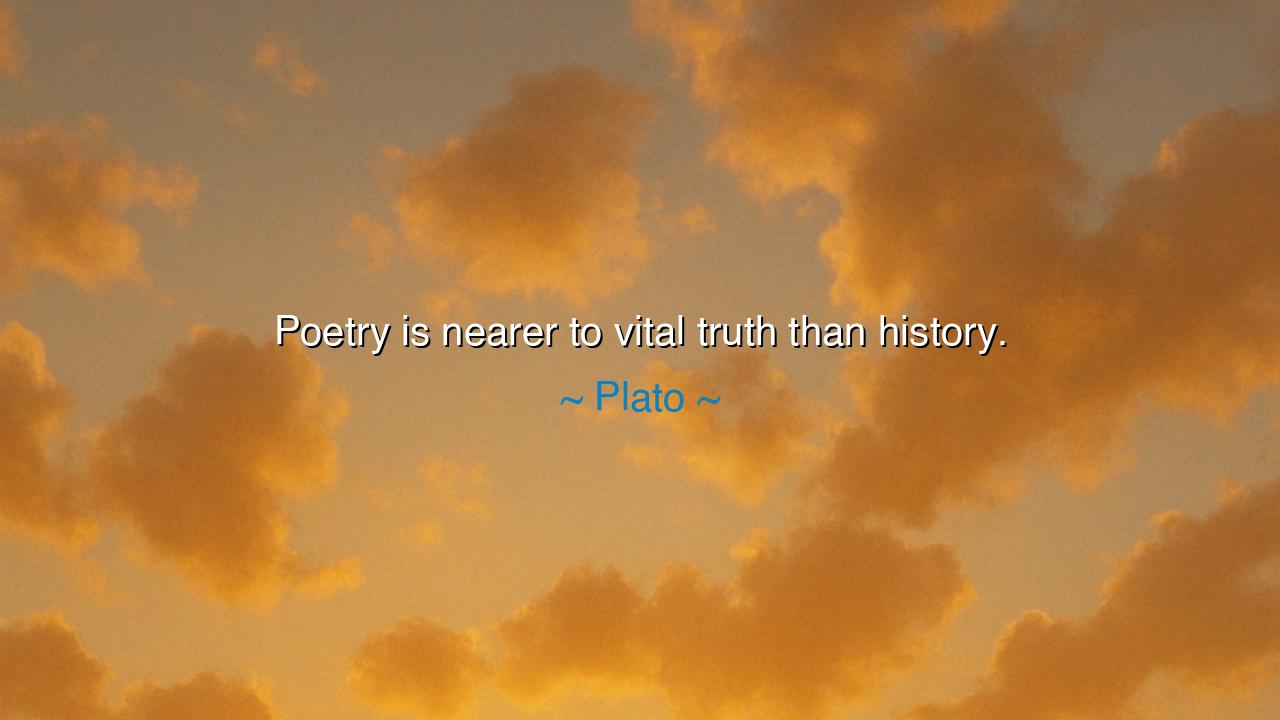
Poetry is nearer to vital truth than history.






The philosopher Plato, whose words have echoed through the corridors of time like the sound of a lyre played by the gods themselves, once declared: “Poetry is nearer to vital truth than history.” In this single, radiant statement, he revealed something eternal about the soul of humankind — that while history tells us what happened, poetry tells us what it meant. History speaks of facts, but poetry speaks of truth — not the truth of dates and kings, but the truth of the human heart. Plato, the student of Socrates and teacher of Aristotle, understood that man does not live by knowledge alone. Facts may describe the world, but it is poetry that teaches us how to feel it, how to understand it, and how to be moved by its beauty and sorrow.
The origin of this quote lies in Plato’s reflections on art, truth, and philosophy, particularly in his dialogues such as The Republic and Ion. Though he often criticized poets for their power to sway emotion over reason, he also recognized that poetry possesses a divine gift — the ability to reveal what logic cannot. When Plato spoke of “vital truth,” he meant that truth which lives in the spirit, which breathes and burns in the hearts of men. He saw that poetry, though it may not always speak literally, reveals the essence of existence more clearly than the chronicles of historians. History records events in their outward form, but poetry unveils their inward meaning — the invisible forces of love, fear, ambition, and hope that shape all human destiny.
To understand this wisdom, one must look not with the eyes of the scholar, but with the eyes of the soul. Consider the difference between the historian and the poet. The historian tells us that the city of Troy fell after ten years of siege; that warriors perished, and that the Greeks returned home victorious. But it is the poet Homer, in his immortal Iliad, who teaches us the true meaning of Troy — the rage of Achilles, the courage of Hector, the grief of Andromache, and the tragic cost of human pride. From history we learn that Troy was destroyed; from poetry we learn why its fall breaks the heart of the world. Thus, poetry reaches beyond the event to touch the vital truth of existence — the truth of what it is to be human.
This is why Plato, though a lover of reason, bowed in awe before the power of poetry. For reason speaks to the mind, but poetry speaks to the whole being. It speaks in images, in rhythm, in the language of the heart. It does not instruct as the teacher does, but awakens as the dawn awakens the earth. Through poetry, the soul remembers what it has always known — the sacred truths buried beneath the noise of daily life. History tells us that men die; poetry tells us that they love, dream, and endure. History tells us of nations and battles; poetry tells us of longing, of faith, of the unyielding spark of spirit that no empire can extinguish.
Consider, too, the story of Wilfred Owen, the poet of the Great War. The historians of his time recorded the strategies, the casualties, the treaties signed in marble halls. But Owen, through his poems — “Anthem for Doomed Youth,” “Dulce et Decorum Est” — revealed the vital truth of that war: not glory, but agony; not triumph, but the pity of sacrifice. His verses, drenched in mud and blood, speak more honestly to the generations that followed than any ledger or report. Through poetry, the dead found a voice, and truth found its witness. Thus, as Plato foretold, poetry became the mirror of life — polished not by the facts of war, but by the human feeling that war had tried to erase.
In this sense, Plato’s statement is not a dismissal of history, but a call to see beyond its surface. For history and poetry are not enemies — they are companions, each incomplete without the other. History gives us the body of the past; poetry gives it a soul. Together, they form the full truth of human experience. But when separated — when we know the facts but forget their feeling — we become as blind men wandering through ruins, unable to sense the living presence that once filled them.
So let this be the lesson for all who seek understanding: learn from history, but listen to poetry. Study the deeds of the world, but do not forget the song that gives them meaning. When you read of the rise and fall of empires, ask not only what happened, but what it meant to the people who lived it. When you face your own trials, let the poet within you give voice to what cannot be explained — your sorrow, your courage, your love. For as Plato taught, poetry is nearer to vital truth because it reveals the eternal within the fleeting, the infinite within the human heart.
Therefore, my children of thought and feeling, do not live as mere historians of your own days. Live as poets — witnesses to the unseen truths that pulse beneath every heartbeat of the world. Speak not only of what is, but of what is felt. For long after the names and dates of history have faded, it is the song — the poetry — that remains, carrying forward the flame of vital truth through all the ages to come.






AAdministratorAdministrator
Welcome, honored guests. Please leave a comment, we will respond soon